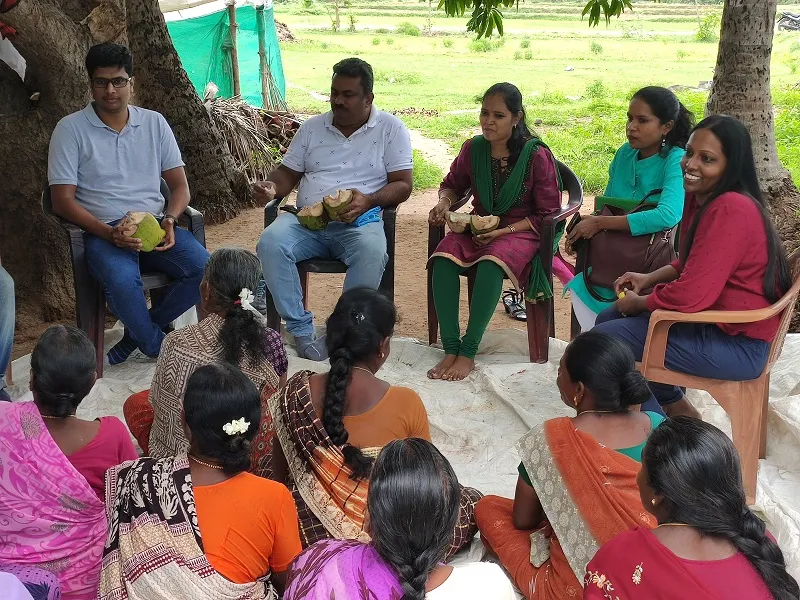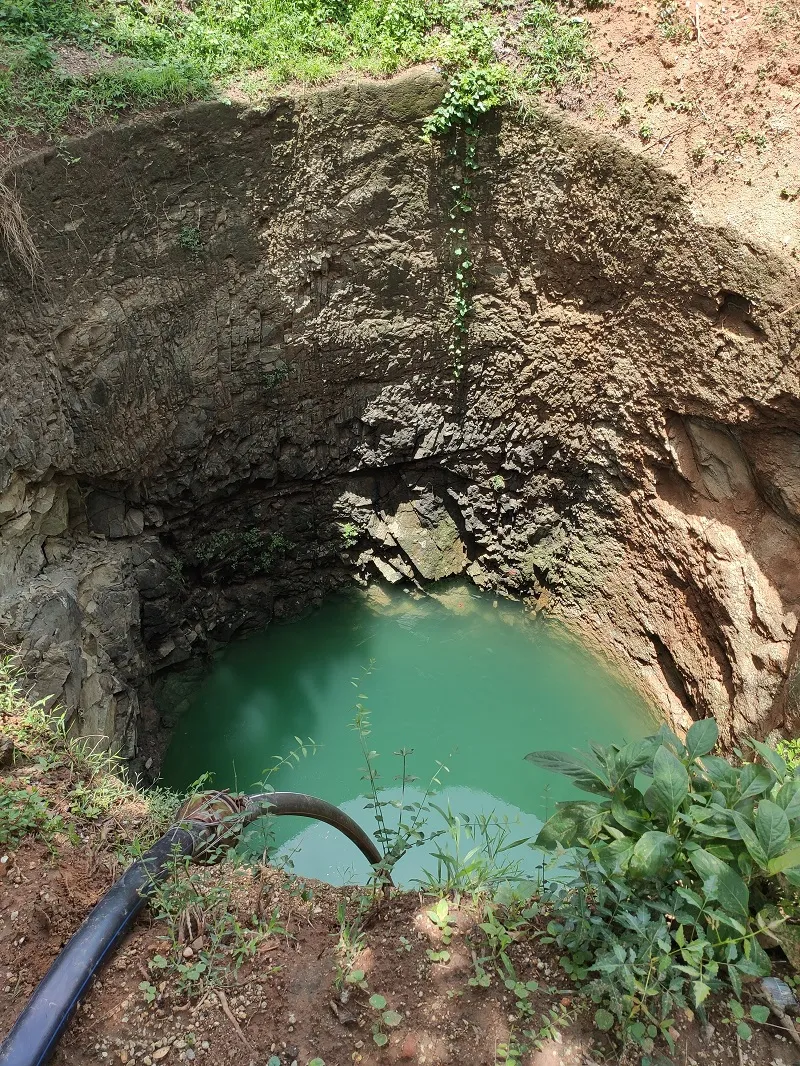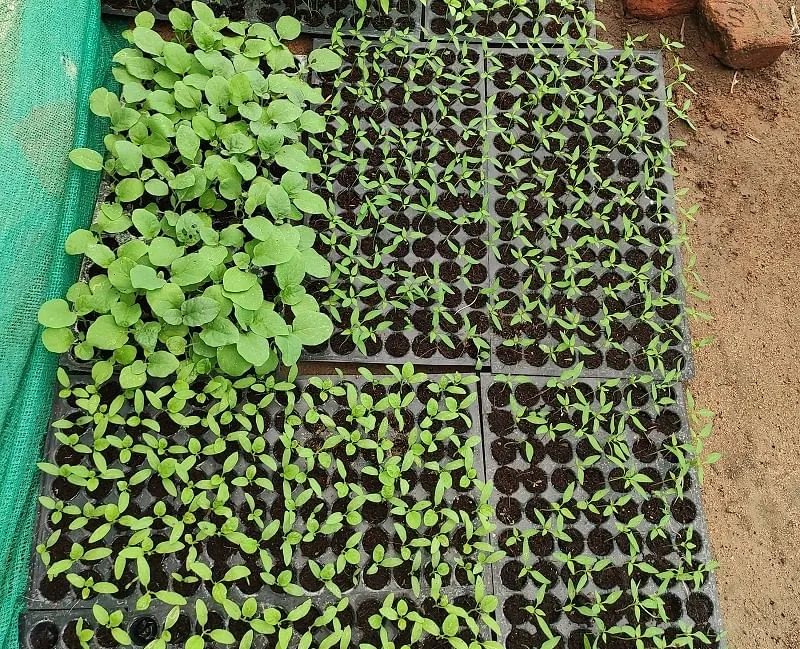Concern India, Verizon empower women farmers in Tamil Nadu—one village at a time
Concern India Foundation and Verizon India aim to empower Tamil Nadu's women farmers by making their lands cultivable, creating market linkages, and training them on various agricultural practices.
Chengalpattu district, formerly a part of the Kancheepuram district in Tamil Nadu, depends entirely on agriculture as its income source.
Nearly 21% of Chengalpattu’s inhabitants are economically disadvantaged, comprising mainly landless agricultural workers and marginal farmers and lack basic amenities, including proper housing, access to water, and healthcare.
In the 1950s, the Tamil Nadu government, under the Bhoodan Movement (land gift movement), gifted land to landless families of Chengalpattu to get them into mainstream society.

Interacting with the women farmers in the area
However, most of these land patches were either barren, wasteland, rocky, or had no water source. And, barring a small area near the river bed of Palar, the majority of the district’s agricultural activities are supported by the monsoon.
The government allocated 38 acres of land to 76 families in Vellapathur and 12 acres to a group of 72 women from the L.Endathur panchayat for agriculture.
Mumbai-based Concern India Foundation realised these women farmers would need support with farming, otherwise engaged as daily wage labourers on other farms.
“Before our intervention, these women farmers from the marginalised sections of the community in Vellaputhur and L. Endathur villages were involved in menial jobs, despite owning farming land of their own. Due to their poor economic condition, they were unable to install irrigation and other facilities to make agriculture their livelihood option,” Kavita Shah, CEO, Concern India Foundation, tells SocialStory.
In April 2019, along with Verizon India’s CSR arm, Concern India implemented a livelihood project to empower marginalised women farmers to have a sustainable livelihood.
The project aims to organise them into groups, provide training to take up agriculture as a primary occupation and infrastructure support, and facilitate market linkages.
Implementing the project
The unemployment level was high among the marginalised communities in the project villages as most were either unskilled or semi-skilled. With no regular income, many male members migrated to big cities in search of jobs.
Vijayaraman J Subramanian, Vice President and Managing Director, Verizon India, says, “The programme helped us aid the transformation of women from daily wage labourers to self-reliant farmers and entrepreneurs by optimising their land resources.”

Deepening the well under Phase 1
Concern India implemented the project in two phases.
In Phase I, the project involved land levelling, soil treatment, reviving three irrigation wells by de-silting, and providing drip irrigation for 50 acres of land, followed by training on agricultural practices, cropping methods, seed processing, natural manure preparation, water management, etc.
The organisation also enabled cohesive farming practices among women farmers and provided marketing and finance management through team building and high-quality seeds.
In Phase II, Concern India helped strengthen the agriculture activity through new-age farming technologies and infrastructure support. It also provided protection to irrigation wells and ponds to mitigate erratic power supply that hampers irrigation.
In fact, it also helped them implement and maintain solar-operated irrigation systems with water sprinklers and multi-purpose power tillers to reduce the cost and time spent on weeding.
According to Concern India Foundation, the project aims to make women from marginalised communities become financial contributors to their families, resulting in an improved standard of living, both economically and socially.
Impact created
Concern India’s project includes resource persons from the state government's horticulture, agriculture, and agriculture marketing departments, as well as farmer producer associations, traditional organic farmers, and organic farm scientists.
It trained them in organic agriculture, soil treatment, horticulture methods, intercrops, creeper shed, seed processing, mulching sheet cultivation method, marketing strategies, natural manure preparation, pest control techniques, herbal tonic preparation methods, and water management.
To date, the project has trained 148 farmers on farming and water management to use these techniques on their land. With the irrigation infrastructure support, the farmer groups claim to have got 5X more yield than before.
Suganya, one of the farmers of the Vellaputhur women farmers group, says, “This is the first time my family is involved in farming continuously. We are occupied all the time, and we are able to earn an income throughout the year.”

Nursery of chilly, tomato and brinjal cultivated by the women farmers
The women farmers of Vellaputhur and L. Endathur villages are now linked to six farmer’s markets, compared to only one market before, where they can sell their produce.
Besides, farmers from the surrounding villages also come to learn from these women.
In 2020, the District Collector of Kancheepuram and members of the state government’s agricultural department made an official visit to these villages to see how the farming project has resulted in better yield.
The officials considered it a model farm and suggested other farmers visit them to enhance their farming practices. Moreover, school and college students from Chennai also visited the farms.
Vijayaraman says, “We aspire to create many more model villages such as these and support in strengthening the backbone of our economy.”
Overcoming industrial challenges
In the first year, despite increasing the depth of three irrigation wells in L.Endathur and Vellaputhur villages, constant power outages, voltage fluctuation, and irregularity in electricity supply became a challenge.
These wells required a three-phase power supply, available only during night hours, which meant male family members stayed late at night on the farms and faced multiple risks like wild animals and snake bites.
To overcome these inconveniences, the organisation decided to construct ponds on each farm, where the water is pumped from the solar-powered irrigation systems and stored on the farm till they need it. They irrigate the farm with the help of solar-powered sprinklers.
This established system ensures that farmers can irrigate their lands as and when needed and not depend on an intermittent power supply.
Moreover, the walls of two wells in Vellaputhur village, which had a slow water infiltration rate, were bored further to enhance the groundwater seepage, increasing water inflow in the region.
Future plans
With the support from the foundation, these farmers have grown in the last two years. They are mature to own common and bigger assets like coolers and recognise team strength. They have also moved away from insecurities and see challenges as opportunities, not threats.
Moving forward, Concern India, along with concerned government departments, will help farmers explore newer markets and linkages to access various schemes.
Edited by Suman Singh


![[Monday Motivation] Meet Himani Nautiyal, the wildlife researcher improving the socio-economic status of Himalayan women farmers](https://images.yourstory.com/cs/5/79900dd0d91311e8a16045a90309d734/MM-and-SS-1635688292132.png?fm=png&auto=format&h=100&w=100&crop=entropy&fit=crop)


![[App Fridays] TikTok lovers, are you ready for Firework, the new short video platform in town?](https://images.yourstory.com/cs/2/a182c7e0140711e987e2f7248b252f46/Firework1571401406063png?mode=crop&crop=faces&ar=1%3A1&format=auto&w=1920&q=75)


